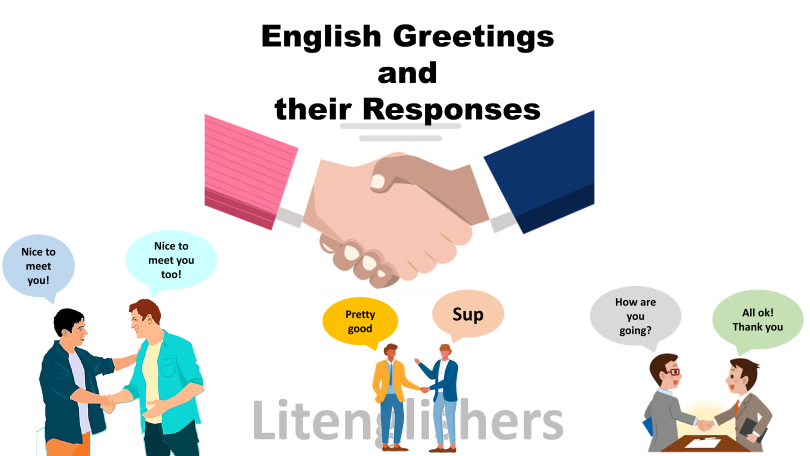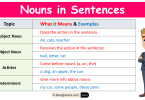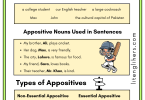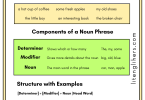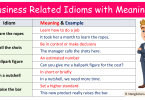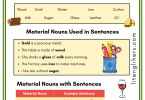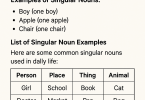Ways to pay greetings and their responses
There are many sentences or phrases we use in our daily life over and over but sometimes we don’t understand how to construe these phrases in English maybe just because of that, our native language isn’t English or maybe we do not pay much attention to these phrases and sometimes we get bored using the same phrases over and over so why not make it little enthralling? Something new or engrossing aside from the boring words.
Do you want to say more than “Hi” or wanna use engrossing phrases at your home or workplace and want to be fluent as a native speaker? Then you are in the right place.
But before starting the substantial thing is to get the knowledge 0f what is phrase.
“A group of words without a subject and verb is known as Phrase.”
Practice makes you perfect so try to make a little effort to get a full grip on these phrases that helps you to become a fluent speaker. For this purpose, you can get help from your English-speaking friend or you can use Google Translator for better pronunciation. You’ll get immediate feedback for the most accurate pronunciation. After you have mastered basic words and their proper pronunciation, it will be a natural transition to learn the longer phrases that make up much 0f everyday conversation.
Some tips and tricks to learn these phrases.
- Try t0 learn at least two phrases each day to focus on and say them aloud at least five to six times.
- Always ready to grasp new words or phrases while watching tv or from anywhere and then try to speak them in front of the mirror.
- Try to use them in real conversation.
- Native English media like TV shows and podcasts can give you lots 0f examples 0f phrases, as well as ways to hear a variety of common phrases used in context.
Here are some thrilling and engrossing phrases to use in our daily life
Basic phrases use for greetings and their responses.
Greetings
Greetings in English! In any situation when using the English language, there will be times that you are required to greet someone and it is therefore very important that you have this type 0f vocabulary under your belt. Here are some greetings that can be used in a variety of situations when conversing with English-speaking people. There are many ways in which you can greet someone using the English language, depending on whether the situation is formal or informal will depend on what sort 0f greeting you use. There are so many to choose from that you can truly make your greetings diverse and interesting.
- Hi/Hello/
- How do you do?
- Sup (A slang term meaning what’s up)
- Hey!
- Bonjour
- Hi ye!
- Hay man!
- Greetings and salutations
- How’s it going?
- Howdy!
- What’s new?
- Morning!
- What’s up?/Whassup!/Whazzup
- Yo! yoyo
- Long time no see!
- How are things?
- Hiya!
- Whatcha
- It’s nice to see you.
- It’s lovely to meet you.
- How have you been?
- Pleased to meet you!
- What’s new?
- It’s pleasure to meet you!
- Good to see you!
- Good evening!/Good Evening.
- What are you been up to?
- Look what the cat dragged in!
- Greetings and salutations!
- How are you feeling today?
- Good morning___, How are you?
- What’s going on?
- Nice to see you again.
- What’s the good word?
- Look who it is!
- How’s business?
- What’s the news?
- Hello! there ____.
- Are you feeling better today?
- Today is very cold/hot, isn’t it?
- How ya doing?
- G’day Mate
- You alright fella/lad?
- It’s great to finally meet you.
- Nice to have met you!
- Good morning, I’m happy you texted me. How are you?
- What took you so long? I missed you
- What’s popping
- What a pleasant surprise
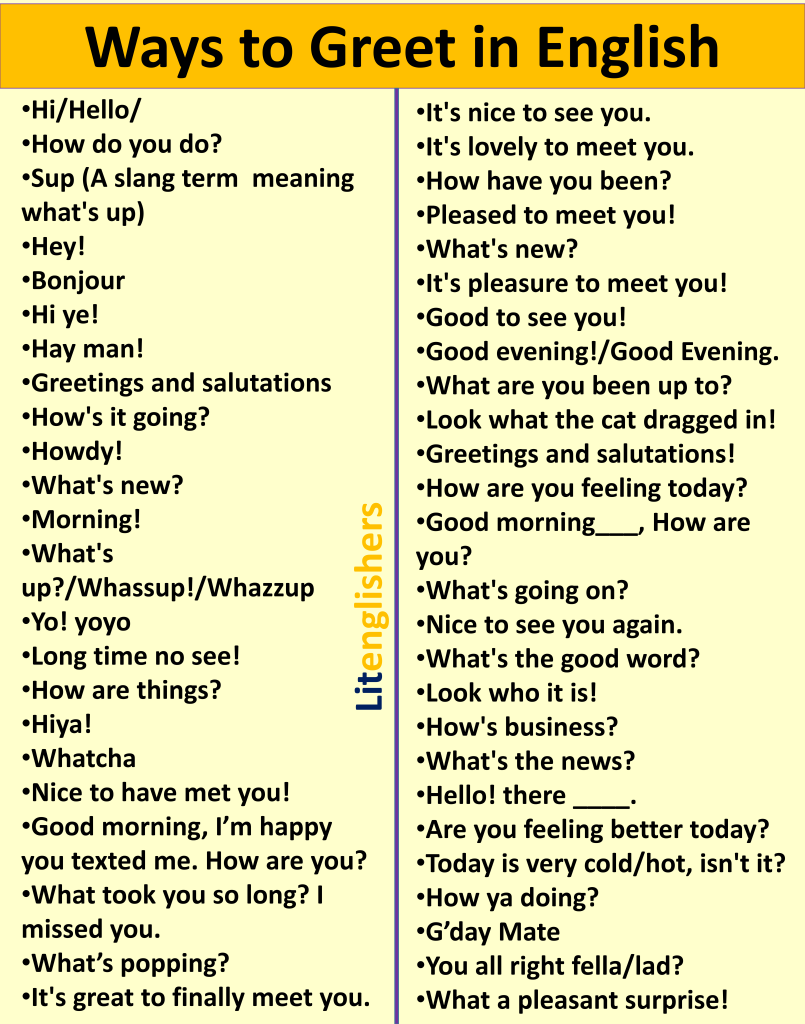
Responses
When people ask us “How are you?” we often reply with a standard phrase like “Fine thanks, and you?”But what if you aren’t OK? What if you want to use a more advanced phrase when you reply to greetings? So here are some responses you could choose.
- Hello! Good afternoon/morning/evening
- Great and you?
- Awesome
- Fantastic
- Good
- Fine
- well
- Excited
- I have been better.
- Pretty good / Pretty well
- Not bad
- I’ve been better before now.
- I’m going through (a bit of) a rough patch.
- I am pretty good.
- Not much
- I am fine thank you.
- I am very well thank you.
- I am very well thank you.
- All right!
- Pretty well! what about you?
- Thanks
- I’m super tired
- I’ve had better days
- I have been well, thank you, what about you?
- I am feeling good.
- Everything is good! thank you.
- Nice to meet you.
- Great! I have been going to the gym/park a lot and I am feeling good.
- All right!
- Not so good.
- Good, you?
- I’m trying to keep my chin up.
- It could be better
- Hanging in there
- Don’t ask!
- I’ve never been better!
- Can’t complain
- Same old
- Comme ci, comme ca (the french expression to say I am ok)
- Nothing, you?
- Nothing much, how ’bout you?
- I have a lot to do, and I’m not feeling well. I’m just totally overwhelmed with life right now.
- worried
- Busy
- Oh, just the usual
- Worn out/fainted/stressed out
- I am hanging in there.
- Not a lot
- I’ve been working a little too hard.
- freaking out
- Nice to meet you
- It’s nice for me to meet you too.
- I don’t feel like talking right now
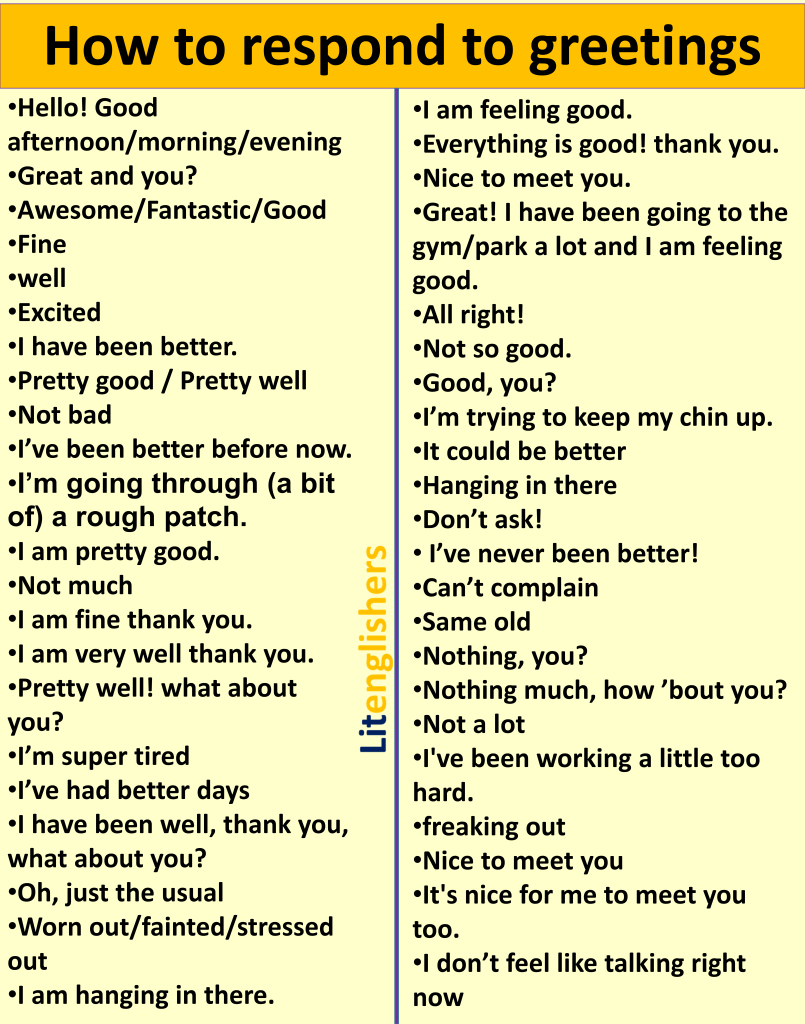
Greetings
- The tone of a greeting is higher than the tone of a real question.
- The speed of a greeting is faster than the speed of a real question.
- When only greeting, people are often moving.
- Depending on the situation, people may be stopped, but have closed or tense body language. For example, they may be texting, talking with someone else, or busy with some other task.
- The situation is one where people are either on their way somewhere or are busy with something.
Way of greeting in different languages
- Asalam-o-alikum in Urdu
- Namaste (नमस्ते) in Hindi
- Ciao in Italian
- Bonjour in French
- Hola in Spanish
- Konnichiwa (今日は ) in Japanese
- Nǐ hǎo (你好!) in Chinese
- Annyeonghaseyo (안녕하세요) in Korean
- Hallo in German
- Yassas (γεια σας) in Greek
- OLÀ in Portuguese
- Xin chào in Vietnamese
- Dia Dhuit in Irish
- Shwmae in Welsh
- Bună ziua in Romanian
- Asalaam Alaikum in Arabic
- Merhaba in Turkish
- Cześć in Polish
- Zdravstvuyte in Russian
- Habari/Shikamoo in Swahili
- Shalom in Hebrew
Tell us how you greet in your language.
